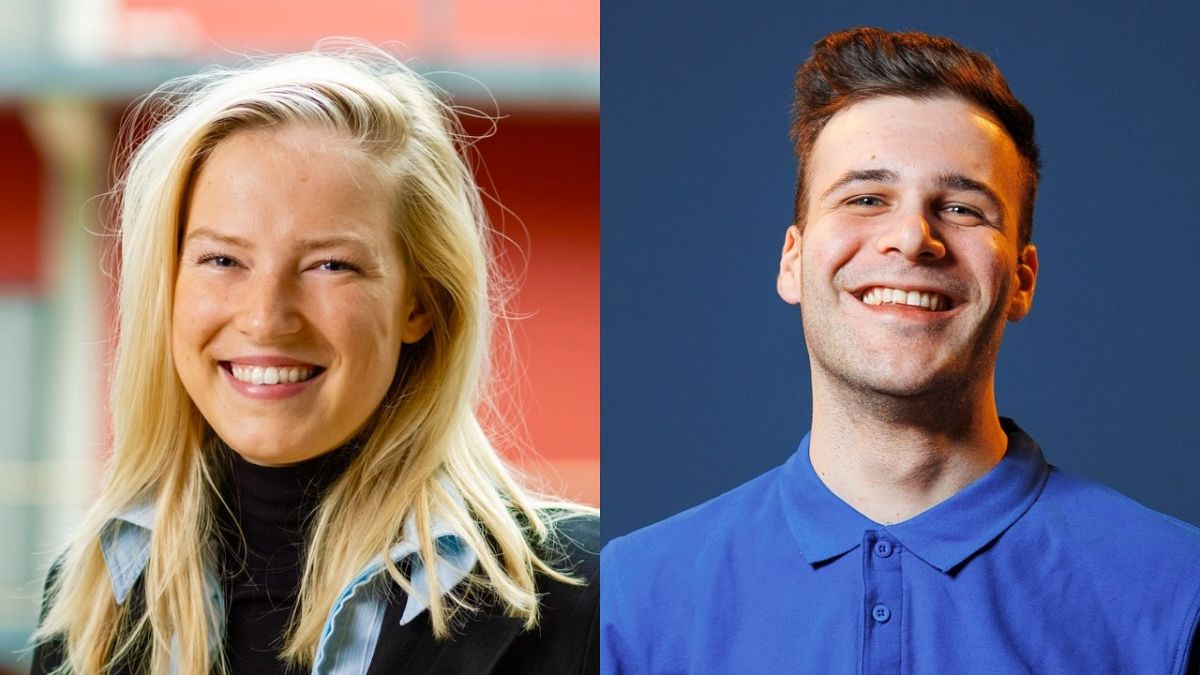Two young academics are turning their knowledge into consumable, entertaining videos ahead of the European elections in June.
Under a banner telling TikTokers to learn more about the European election, Alessandro Marcia, 26, walks around Valletta with a friend of his, a candidate in Malta’s election, to show them what a day in his life is like.
They stop at the market to chat with people, then the video takes a sharp cut to Marcia’s friend recording a video before a local debate.
A few more handshakes come before an end-of-day cappuccino between friends, where they talk in Italian about federalism and why votes in smaller European states are important.
“Federalism needs to take into account the needs of the whole continent, not just the big founding states [of the European Union],” Marcia, a PhD researcher at Maastricht University says straight to the camera.
His friend laughs and manages to plug the name of his political party before they both say an enthusiastic “ciao!” to the camera with a wave.
Marcia is one example of a small but dynamic online community of independent content creators on TikTok and Instagram that are working to reach young voters ahead of the European elections on June 9th.
‘One video can give you the curiosity’
Content creation is important, Marcia said, because it means he can contribute his expertise as an academic to greater society and answer any questions that his young audience of 18 to 20-year-olds have about the EU and the voting process.
They ask Marcia about a range of topics such as how the legislative process works or about the actual powers and competencies of EU bodies.
Lately, there have also been lots of questions about EU foreign policy due to the Russian war in Ukraine and rising tensions in the Middle East.
“Maybe they do not learn 100 per cent through social media but one video can give you the curiosity to read an article or Google EU competencies or watch a video on YouTube, you know, to spark the curiosity,” Marcia said.
In the Netherlands, Emma Prins, a lecturer with the Hague University’s European Studies programme, uses TikTok to keep her students engaged outside of class time.
Prins, 27, learned that most if not all her students were getting news through TikTok, so she figured why not join them there.
“I’m trying to make my students look at sources for where European content comes from: EU websites, academic journals, traditional media…but I really have to force it because they don’t look at those sources by themselves,” Prins said.
“It’s a small step for students to open their social media, it’s a much bigger step to find explanatory videos or read a text or a book”.
But the algorithm isn’t always in her favour.
Her apolitical educational content about European institutions often gets far fewer views than content where she asks a debate question, like if the EU was a post-colonial experiment.
That type of framing, even though Prins said that’s not what she’s going for, attracts the trolls and far-right political accounts that try to dissuade people from voting.
Providing ‘a bit more nuance’
Concerns about TikTok, however, have grown as the election draws closer.
The app is now under two separate investigations under the European Commission’s Digital Services Act over its “protection of minors” and “addictive design” for the platform’s new TikTok Lite, which the company subsequently suspended.
Ahead of the election, TikTok launched local election centres inside the app for each of the 27 EU states to “ensure people can easily separate fact from fiction,” a February statement reads.
TikTok says they have a team of over 6,000 people moderating EU content and claims to be able to take down 99 per cent of all election and civic misinformation before it is reported.
Yet, Prins and Marcia said far-right politicians are really taking to the platform.
For example, Germany’s right-wing Alternative for Germany (AfD) is the most present of all the country’s political parties on TikTok, according to Reuters.
The AfD had roughly 420,600 followers as of this week, while their former top candidate, Maximilian Krah has 46,500 followers. Krah has since stepped down from the party’s federal executive board after a string of controversies.
Both creators are convinced that, if they leave the platform, there will be more space in the algorithms for those right-wing viewpoints to take over.
“I’m very aware that it’s not the ideal platform, but if this is what [young people] are consuming … I need to try to provide a bit more nuance,” Prins said.
‘There’s a lot at stake’
Despite the controversy with TikTok, both Marcia and Prins will keep using the platform and ramp up their election-related content ahead of the vote.
For Prins, she said the focus of her content is going to be on election predictions, the concrete opportunities like traineeships or internships that the EU can offer young people and examples of how youth are getting mobilised.
Marcia, on the other hand, wants to take things back to basics. He’s looking to do a series of videos that answer really fundamental questions like “What is the EU?” or “What are the different EU institutions?” so people know how the bodies function before they head to the ballot box.
Neither is hoping to convince people to vote or influence them on who to vote for: they just want to give them as much unbiased information as they can to make what they say is a crucial decision.
“There’s a lot at stake,” Marcia said. “I think [we’re voting for] what kind of European Union we want: do we want more integration or … do we want to go back to a time where we were more divided”.

